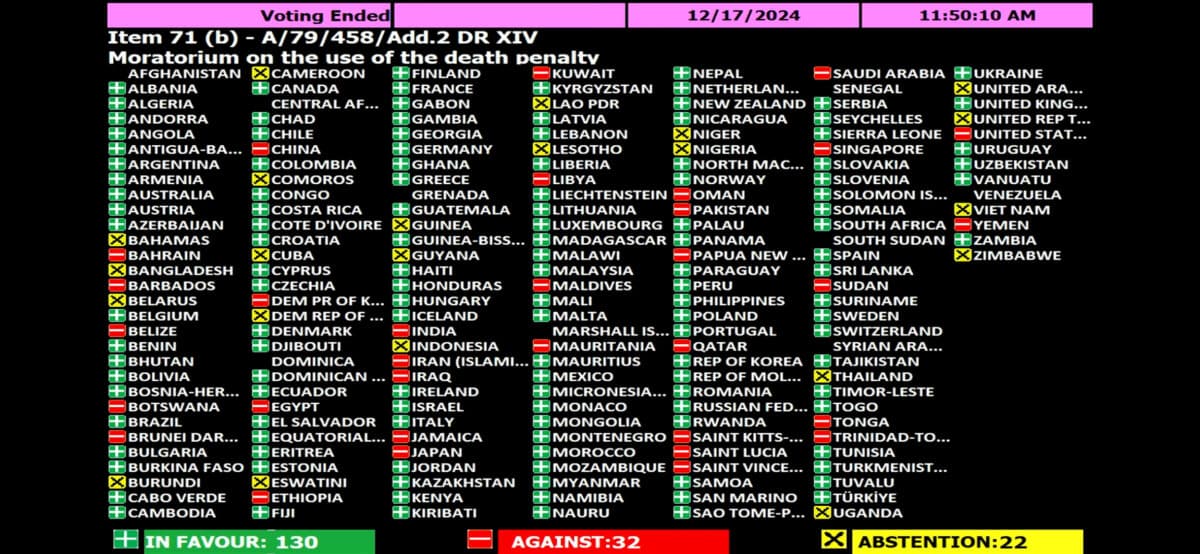
Bahrain: Joint appeal for commutation and moratorium
MENA
Statement
Joint Appeal was published on World Day Against the Death Penlaty on 10 October 2021 and sent to the Bahraini Embassy in France, UK and Switzerland.
Joint appeal – Bahrain:
His Majesty, King Hamad bin Isa Al Khalifa, Kingdom of Bahrain,
We write to you and your government on the 2021 World Day Against the Death Penalty to urge you to once again take steps to minimise and ultimately end the use of the death penalty in Bahrain.
Our organisations, alongside an ever-growing number of people and governments across the world, informed by the values and aspirations set out in the 1948 Universal Declaration of Human Rights, believe that the death penalty is the ultimate cruel, inhuman and degrading punishment.
We note that in previous years, between 2007 and 2020, Bahrain has, abstained four times when the United Nations’ General Assembly has voted on the establishment of a moratorium on the death penalty and that for a seven year period the govern observed a de facto moratorium on the implementation of the death penalty.
Our organisations and institutions, listed below, oppose the death penalty in all cases without exception – regardless of who is accused, the nature or circumstances of the crime, guilt or innocence or method of execution since we believe that death penalty breaches human rights, in particular the right to life and the right to live free from torture or cruel, inhuman or degrading treatment or punishment.
Your Majesty, we urge you and the government of Bahrain to join the 19 of the 57 states in the Organisation of Islamic Cooperation which are abolitionist in relation to the death penalty[1].
As you are no doubt aware, use of the death penalty is irreversible, while in cases across the globe have shown that mistakes occur in the imposition of the punishment.[2] Its use, moreover, has been shown in reputable studies across the world, not to reduce the crimes which it is meant to punish. It is used in contexts where the administration of justice itself, may be flawed – including in Bahrain (see below) – and it can be imposed, whether knowingly or not, in a discriminatory manner, including in relation to political disputes.
Accordingly, we call on you to:
Commute, immediately, as a first step, every case where the Court of Cassation has upheld the death penalty in Bahrain. According to Amnesty International, at the end of 2020, there were 27 such cases in Bahrain[3];
End Bahrain’s opposition to the biennial resolution at the United nations General Assembly (UNGA) calling for the establishment of a moratorium on executions with a view to fully abolishing the death penalty, including by voting in favour or at least abstaining in the 2022 vote[4]; and
Declare a moratorium on the implementation of the death penalty in Bahrain.
Our organisations will seek meetings with Bahrain government missions following publication of this appeal. We will try and convince you and your government that freezing the use and application of the death penalty in Bahrain, with a view to ending it completely by way of removal in law, is in accord with the human rights aspirations and objectives of the Kingdom of Bahrain. We will make the case for Bahrain to sign and ratify the 1989 Second Optional Protocol to the International Covenant on Civil and Political Rights (to which Bahrain became a state party in 2006), aiming at the abolition of the death penalty[5].
This course of action addresses slowly growing calls, in Bahrain and across the Gulf, for the end to the use of the death penalty, voiced by Bahraini, Gulf, regional and thematic civil society voices.
But above all, as shown by states across the world, it is the moral, ethical path to take, putting life and human dignity above all other considerations.
We look forward to engaging with Bahraini authorities on this pressing and urgent matter.
SIGNATORIES:
Action by Christians for the Abolition of Torture (ACAT) – France
ALQST for Human Rights
Bahrain Human Rights Society
Center for Prisoners’ Rights Japan
Centre d’Etudes et d’Initiatives de Solidarité Internationale
CIBELE
Coalition Tunisienne Contre la Peine de Mort
FIDU Federazione Italiana Diritti Umani
Forum Marocain Pour la Vérité et la Justice
German Coalition to Abolish the Death Penalty
Japan Innocence and Death Penalty Information Center
lifespark
Muwatin Media Network
Organisation Contre la Torture en Tunisie
Pax Christi Uvira asbl
Réseau syndical international de solidarité et de lutes
Salam for Democracy and Human Rights
Syndicat National des Agents de la Formation et de l’éducation du Niger (SYNAFEN NIGER)
The Omani Centre for Human Rights
Together against the Death Penalty (ECPM)
World Coalition against the Death Penalty
[1] See Nael Georges / Ensemble Contre la Peine de Mort: The Process of Abolishing the Death Penalty in Member States of the Organisation of Islamic Cooperation, 2020, accessed 2 October 2021 at: https://www.ecpm.org/wp-content/uploads/rapport-OCI-2020-GB-191120-web.pdf
[2] Since 1973, for example, more than 184 prisoners sent to death row in the USA have later been exonerated or released from death row on grounds of innocence. Others have been executed despite serious doubts about their guilt.
[3] Death sentences and executions 2020, 21 April 2021, accessed 30 September 2021, at: https://www.amnesty.org/en/documents/act50/3760/2021/en/
[4] At the December 2020 plenary session of the UN General Assembly (UNGA), 123 states supported the adoption of the resolution, UN General Assembly Resolution 75/183 of 16 December 2020, which constitutes an increase of 19 votes compared to 2007, when the first UNGA resolution on this issue was adopted. In 2020, Bahrain’s neighbour and ally, the United Arab Emirates (UAE) abstained.
[5] It provides for the total abolition of the death penalty but allows states parties to retain the death penalty in time of war if they make a reservation to that effect at the time of ratifying or acceding to the Protocol.







